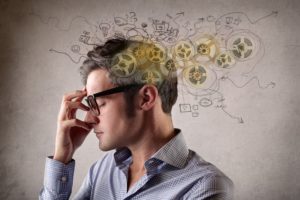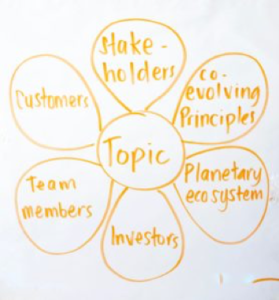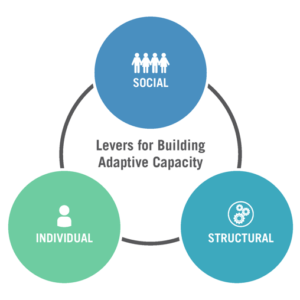Thinking Differently About Culture – Part One
Jun 02, 2021
How often do potentially expansive discussions devolve into people sharing from experience and expertise rather than thinking critically and generating new or original ideas?
Insight from a workshop we ran in 2019, 35 people from at least 20 different organisations came together to discuss how to enable positive cultural evolution in our organisations and worlds. If the ideas and principles that emerged from discussions ever came into being, we would have a substantially different world to live in.
To enable a conversation where new ideas could flourish, participants were invited to stretch their thinking beyond their current or past ways of thinking and operating. Prior to the discussions, we shared a number of concepts, principles and frameworks to support this:
There is a difference between thinking and thought

Often we confuse the two. Thought is a result of conditioning and prior knowledge, collected information and experience. Thinking involves our whole being, our ability to sense into something and enable original or unique ideas to emerge. Participants were invited to start to differentiate from thought and thinking and do their best to put their established perspectives to the side to enable more creative original thinking. In groups, they were invited to question the assumptions and worldviews that ideas sprung from and how these might limit or expand their effectiveness. Part of the work required was the self-awareness to move from “proving my knowledge or expertise” to curiosity and learning.
The wider the systems we consider, the more likely we are to generate true momentum and evolution

The Adaptive Cultures framework and approach to culture and transformation is built on seeing organisations, individuals and collectives as living systems. Participants were invited to take the perspectives of a range of systems and stakeholders in their conversations including our planetary eco-system.
The Three Levers for cultural evolution – Individual, Social and Structural

To enable sustainable cultural evolution, individual and collective worldviews, ways of working and relating as well as structures, systems and processes all need to evolve. It is like a three-legged stool, if one leg is missing the entire stool will fall over. Participants were invited to consider the interrelationship of these aspects of cultural evolution and ways to evolve each lever cohesively.
Co-evolving principles
To imagine a co-evolving culture, the following principles can be a useful guide:
- Everything is and always will be progressive, emergent and an opportunity to evolve
- Greater creativity is able to emerge when we can be non-attached to worldviews or ways of working
- As living systems, organisations impact and are impacted by multiple systems, and their evolution can influence the evolution of multiple systems
- Organisations as a form of collective endeavour, can exist to be in service of accelerating the emergence of new potentials. To bring this to life requires disrupting established ways of thinking and behaving
The community set about imagining a new and better future through the lens of a co-evolving organisation. In our next article, we’ll share some of the collective insights that emerged.
If you would like to be a part of this community and an ongoing conversation, please join us.
Many of our community have participated in our Practitioner Accreditation Program, the next one begins in February 2022.
Our Adaptive Cultures Community
Our Global Community is an enriching space for culture practitioners to share, learn from, explore and develop emerging practices in support of their clients developing needs. On our community platform we share methods and tools, ask questions, conduct developmental conversations and learn together.
Read the Adaptive
Organisations Whitepaper
Download our Adaptive Organisations Whitepaper and learn how to evolve through change and complexity. To receive a copy, please fill in your details below and a copy will be emailed to you.


